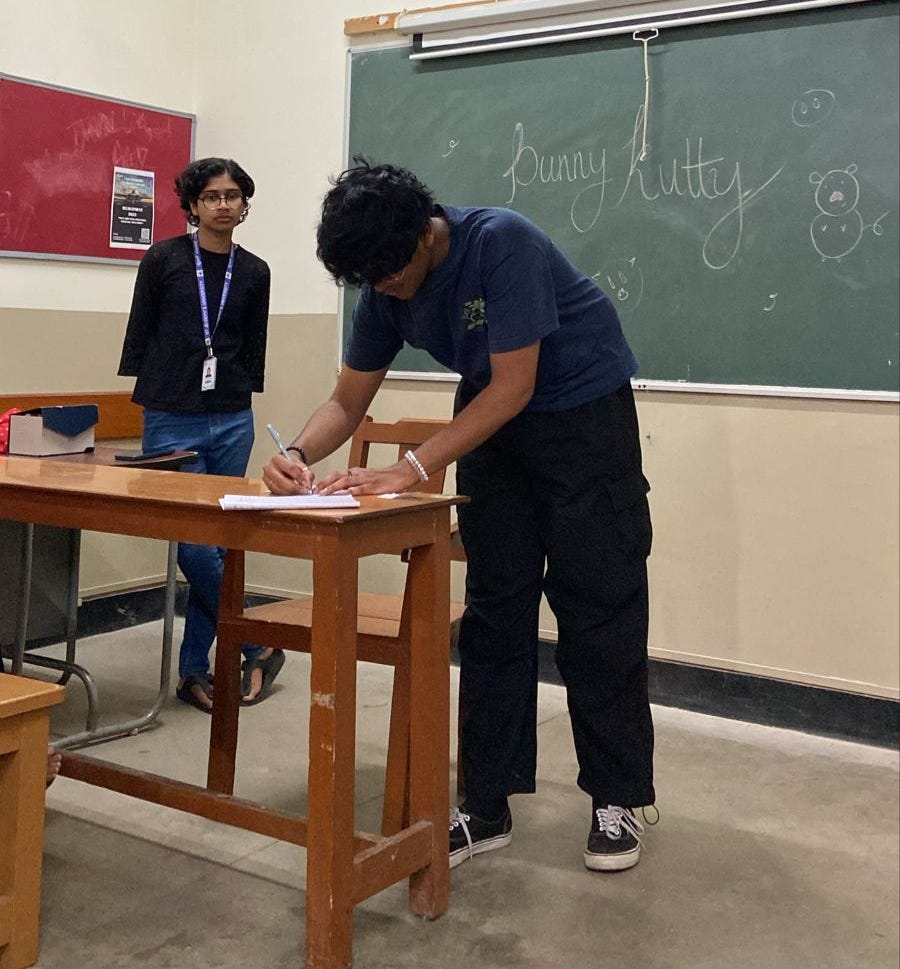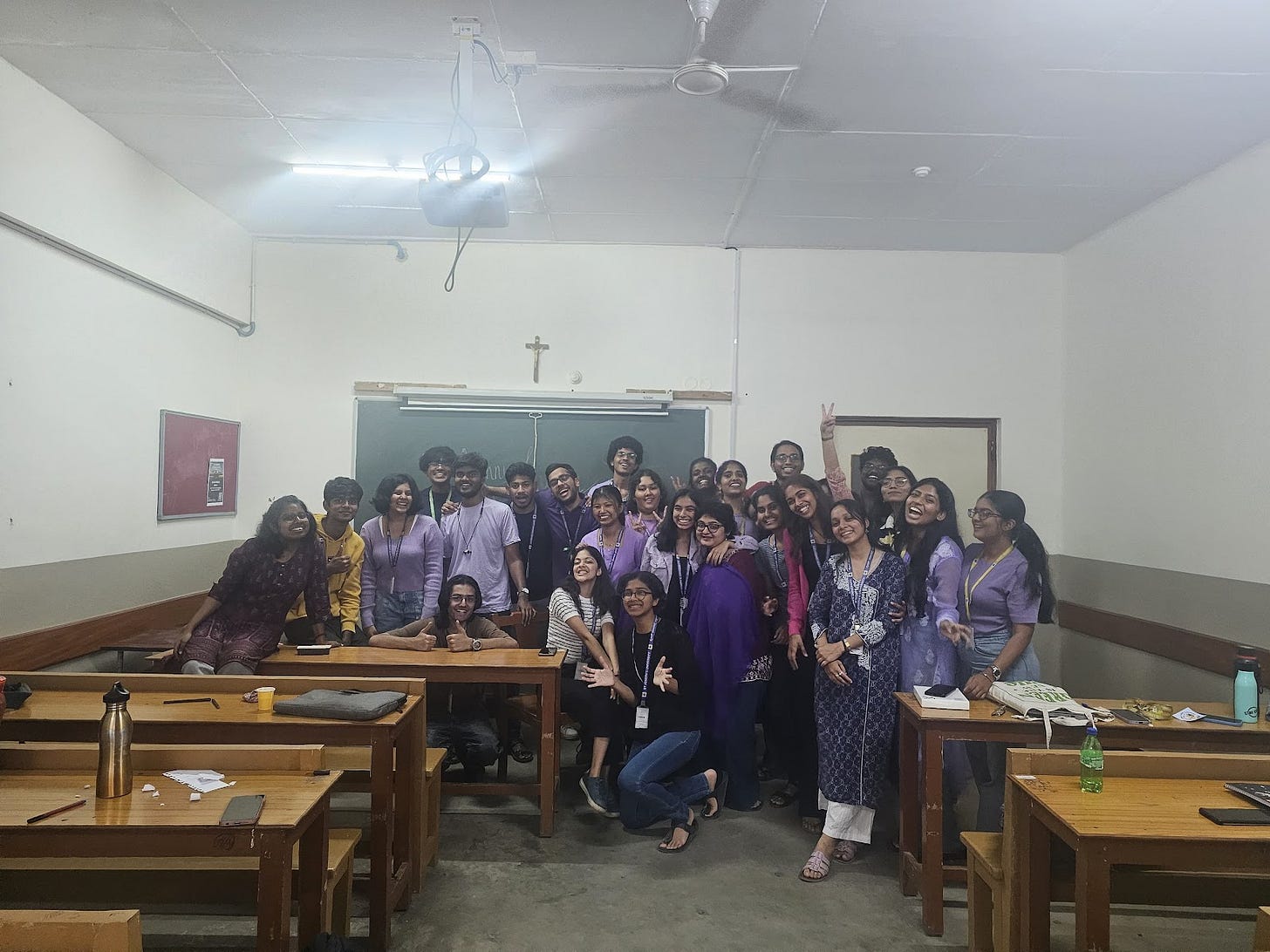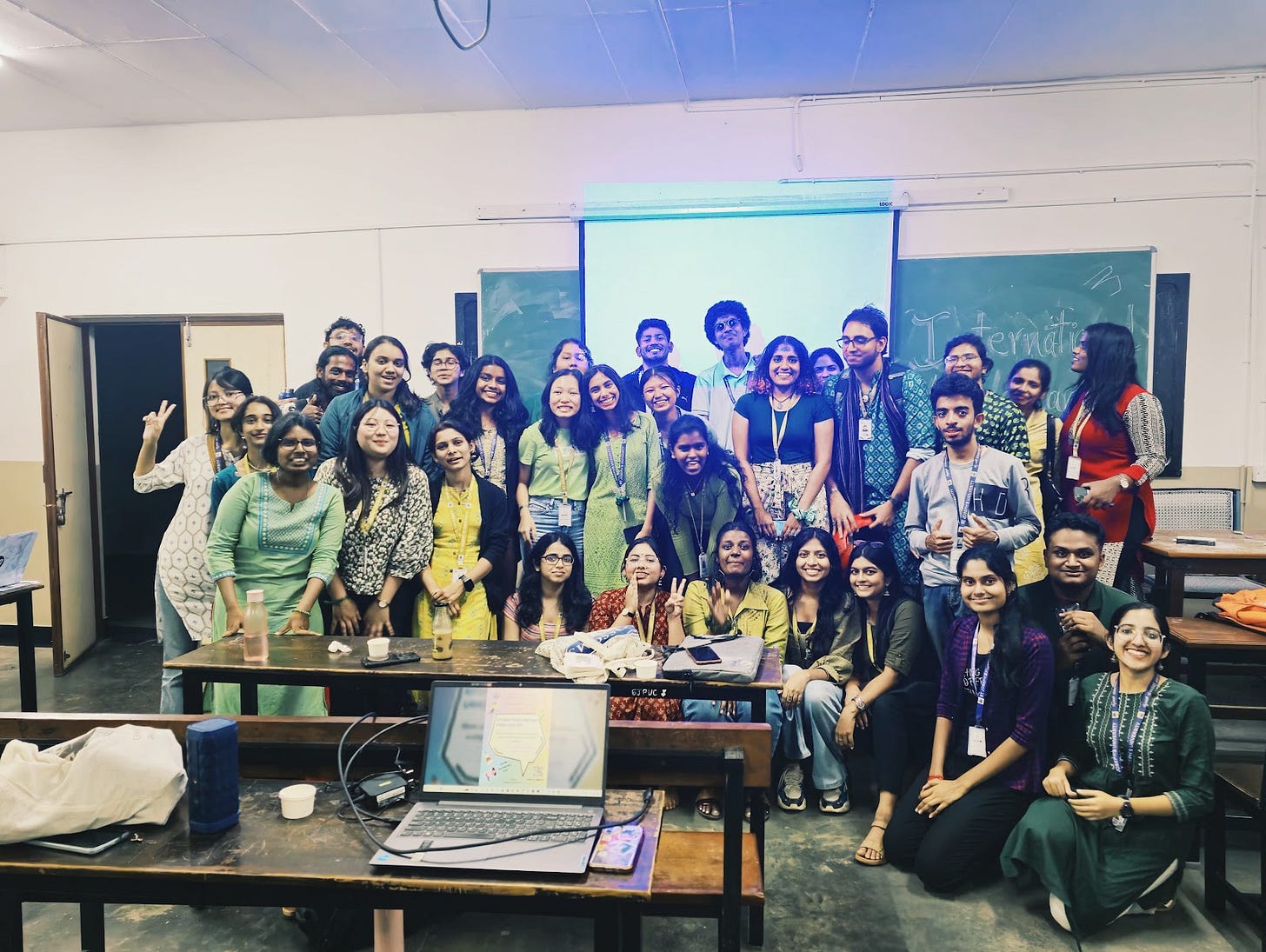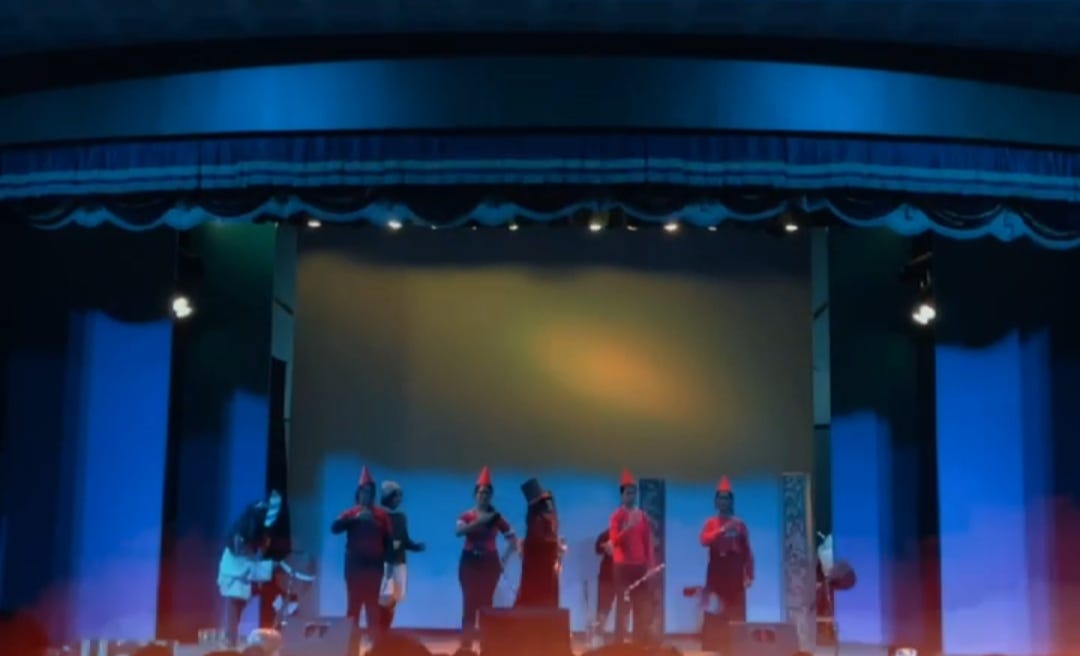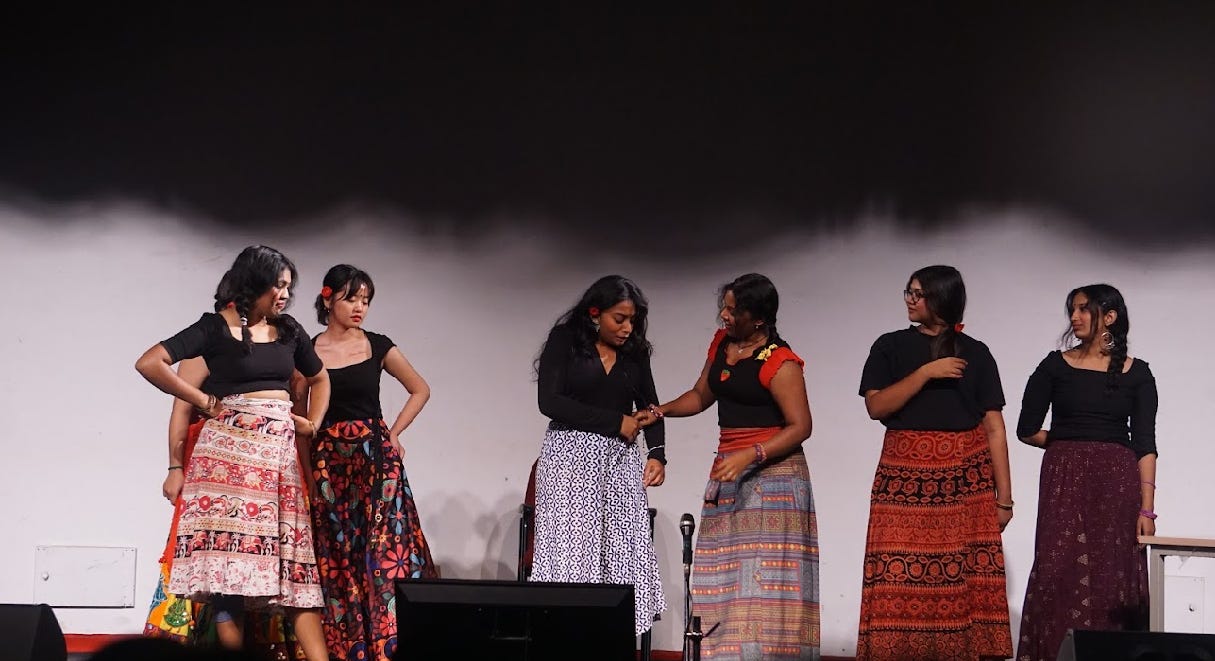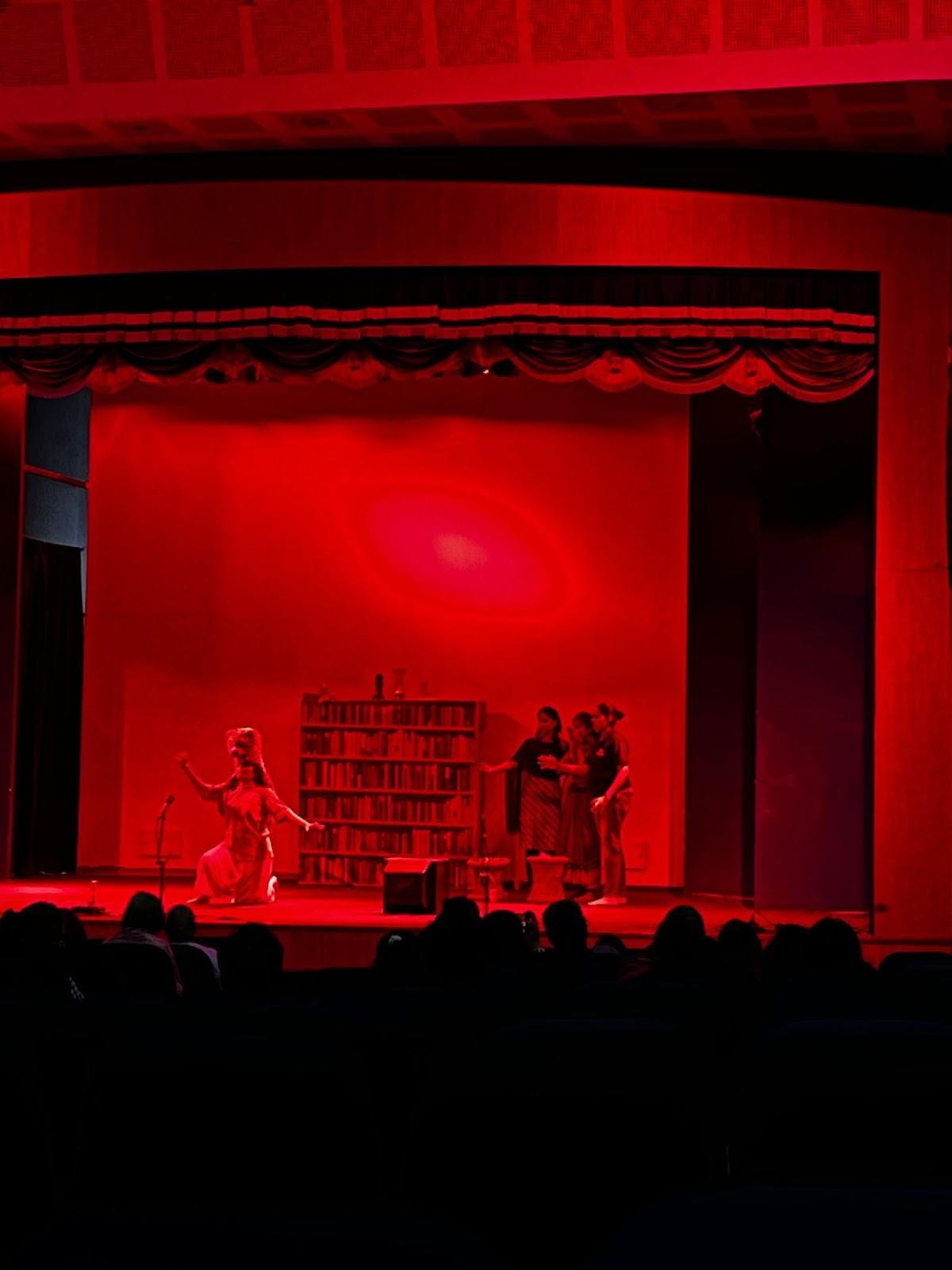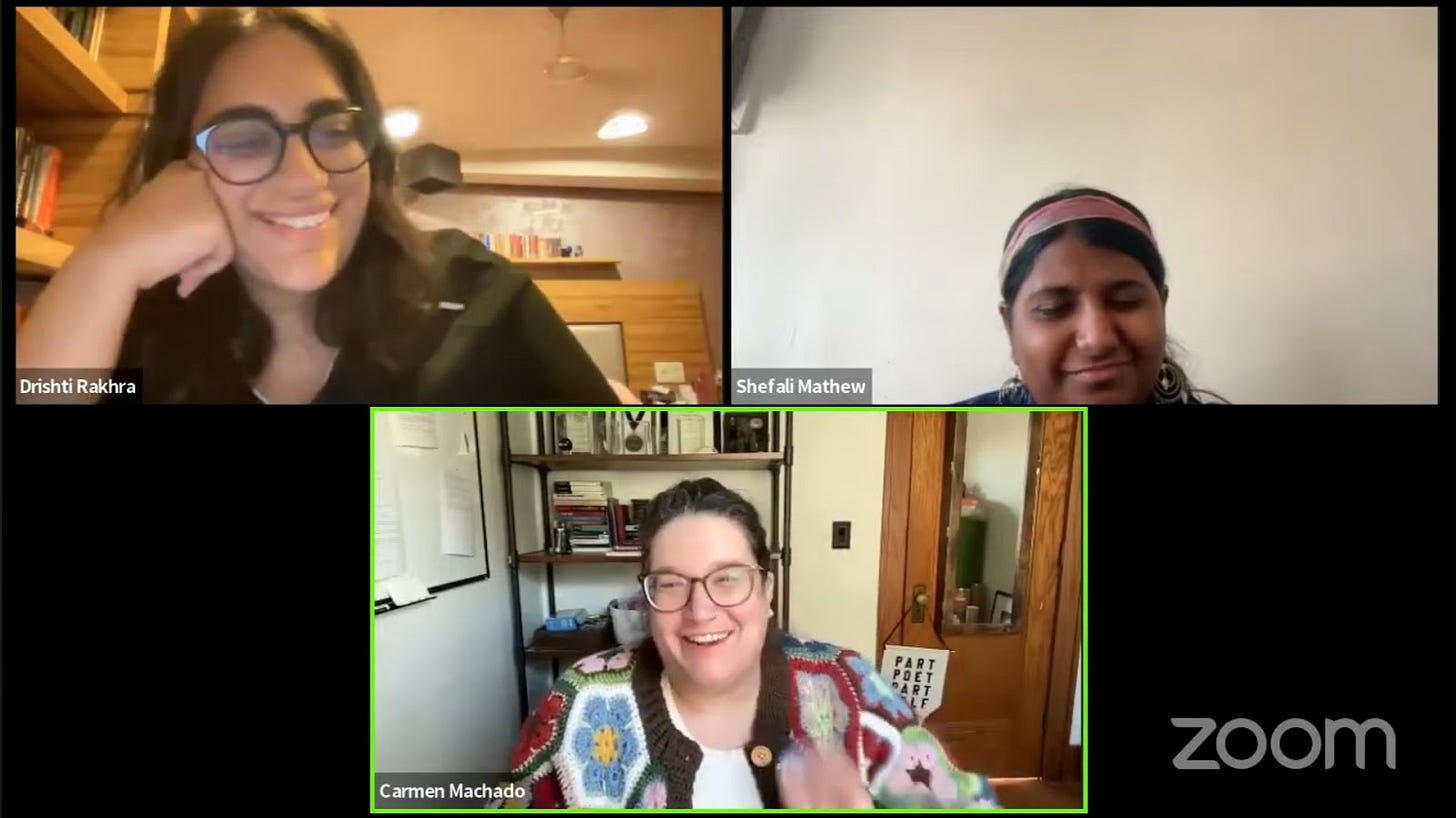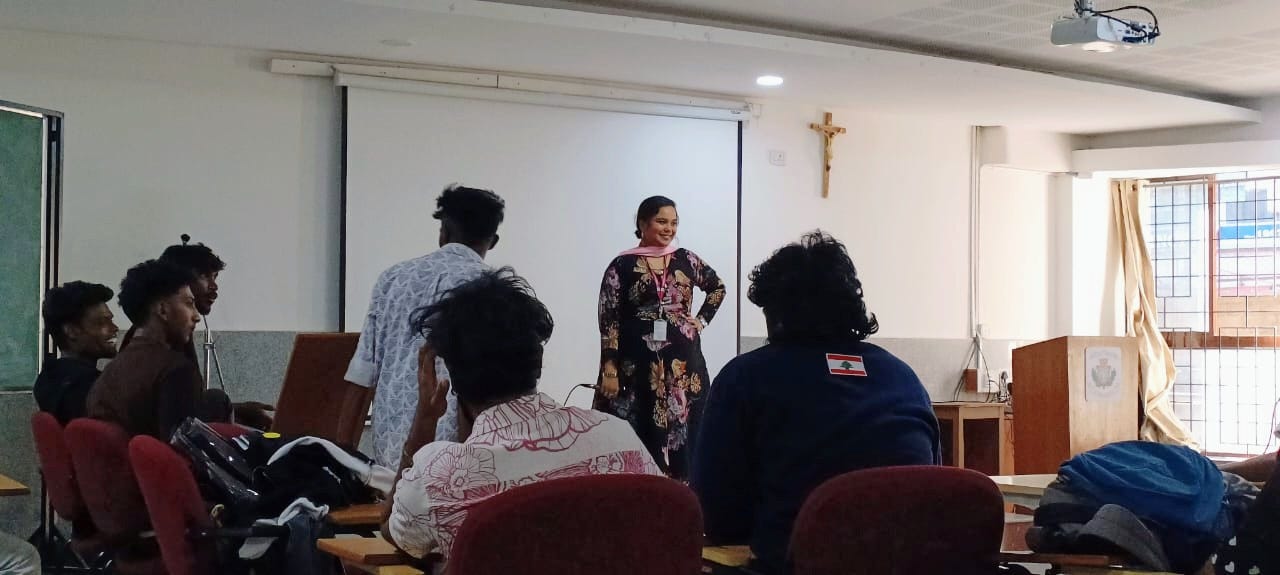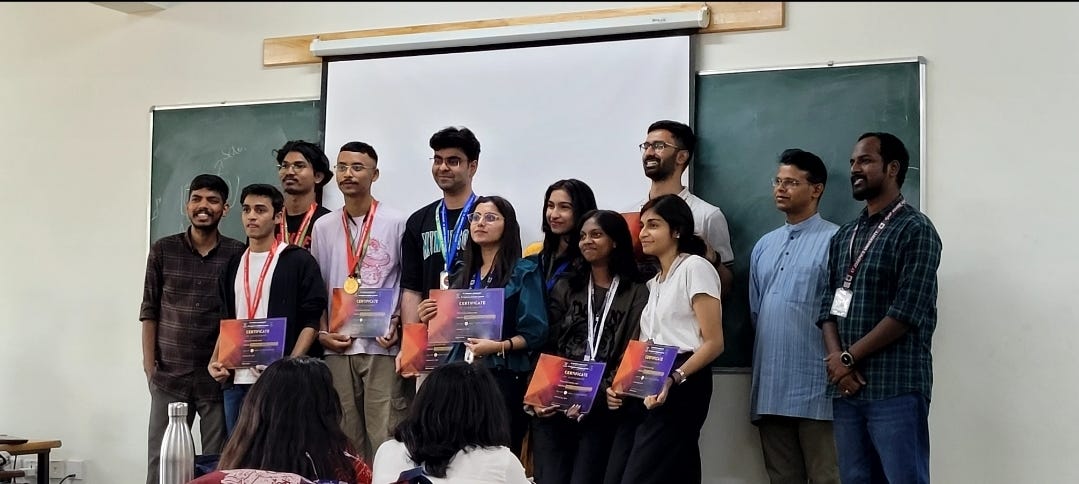Knock Knock: SJU Festivities
Through digital ink, we hand the readers our offering of SJU fests and events, a simple concoction of theater, linguistics, marathons and more. Discover the essence of our community in one package.
Punny Kutty: A Place for Puns
Aaron A. Menezes
"What do you call it when LingSoc holds a pun competition? Punny Cutie'' - a pun made by Jerry Joby, the winner of Punny Kutty. On 22nd February, the Linguistic Society from the Department of English at St. Joseph's University held a pun-making competition as part of their festival Samaentiks 2024. First held in 2019 as part of Metonym, Punny Kutty looks at the potential of language and what people can do with it. It is meant for people to have fun with language through wordplay and puns.
Ever since it was introduced, Punny Kutty has been won by women. However this time, Shweta Philip from 2nd year MA English came in third. Rudransh from 1st year JNOE and Suryan from 1st year CHBT came in second. And Jerry Joby from 1st year OEPY came in first. He was performing and punning at every occasion.
There were 12 participants, some of whom were roped into participating by a few professors. They were judged by Prof. Nikitha. The first point was on how well they were able to play with the prompts given to them. There were good and bad puns, but it depended on how punners delivered them; if they had confidence in their puns, or conviction in their voice. She also gave points to those who were punning in between.
Every participant was able to make around 3 to 5 puns for their prompt. But some of them were able to make a lot more when they found the right way to twist and turn pronunciation and ideas. Suryan was able to do this with 'claw clip' in the second round, churning out puns like “aww clip”, “short clip”, etc. Shweta was also able to do it with the name 'Aaron', creating “ironic”, “moronic” etc.
(Suryan crafting his puns)
It was a competition with an informal atmosphere. Some came to test themselves and share puns with each other, while others came to see their friends crash and burn. It had two rounds where participants had to make puns for 60 seconds after being given 30 seconds to prepare their puns from the prompts given.
Even the professors were roped into making puns. Prof. Amritha made puns on Cyclone Son-ak-shi, and Prof. Drishti made a pun about Wil-Son Garden. Prof. Nikitha and Prof. Gayatri made puns on 'Mystery' while Prof. Gayatri sang it to the Cadbury ad theme. Prof. Cynthia also made puns on Prof. Nikitha “Franny” Thomas.
Just like the first Punny Kutty, Anika, also known as Pun-ika, lost her ability to make puns when participating. This time, some punners were confused with their prompts, and others almost gave up. Some quit after making 1 or 2 puns, because they could not think of any more puns or were extremely embarrassed about the ones they made.
Some puns got cheers and laughter, while others did not go over so well. However, the audience traded puns with each other during the competition. They also mentioned their favorite puns, and missed opportunities. Even days later, Suryan continues his tradition of puns and jokes with his grandfather, while Ramakrishnan and others from the audience still cannot stop making puns.
Anaphora
Antony Manakil
While most students have left their classrooms, A314 is as lively as ever. Anaphora, an event organized by the Linguistic Society, was held on the 22nd of February. Anaphora was held during the lunch break with participants, organizers, and onlookers sacrificing their timely lunch to participate in some good old-fashioned linguistic detective work.
In Anaphora, participants must compete against each other to answer questions and solve problems by referring to a set of clues kindly provided by the organizers. But here’s the catch: To answer the questions and ultimately grab the podium, contestants must decipher an entirely made-up language. Yikes. It wouldn’t be the Linguistic Society if their events didn’t twist and tie our tongues. I was glad I hadn’t decided to participate. Anaphora was held as a part of the second day of Samaentiks, SJU's annual linguistics festival. Samaentiks runs over the course of several days featuring events involving cultural expressions of one’s mother language, a spelling bee, zine-making and more.
Ishwarya, the Linguistic Society’s Joint Secretary and a fellow classmate, greets me as I make my way to a desk at the front. On the desk is a neatly arranged pile of merch for Samaentiks which Ishwarya quickly coerces me into buying. I bought a rather adorable sticker of a cat adorned by a loading symbol with text above the cat that reads “Calculating how many classes I skip this semester”. Same Mr. Meme-Cat, same. The trusty projector switches on as students continue to fill in the seats. Most of the contestants are in groups of 2 and are handed A4 sheets of plain white paper to jot down their answers.
As contestants seat themselves, an organizer explains the rules and instructions for the event to the participants. He reveals that both the questions and the fictional languages were crafted by Dr. Arul Mani, the Dean of the School of Languages and Literature. The projector flashes the questions. And the students begin to wrack their brains to decipher the fictional Tlongan dialect and the language of Bargon to answer the questions, accompanied by clues. For example, the first question requires the Tlongan words for fish, market, and food. An organizer says, "It's impossible to cheat on this’. And the students are thus allowed to take photos of the screen. A little while after the contestants put down their pens, Dr. Arul Mani waltzes in making a quick pit stop. ‘None of these languages exist, I made them up,’ he says. He then quickly reveals the answers before leaving. And as the answers are revealed, sounds of both dismay and pride fill the room. An organizer jokes, once Dr. Mani is out of sight, that the beloved Dean has too much time on his hands to come up with such languages.
Anaphora carried on to the second round the very next day with Keerthana S and Prarthana Sharon (II ESBY) being crowned the winners. Sani Hurmain and Leah PV (I OEPY) and Misbha and Aditya (II JPY and JPP) won the silver and bronze respectively.
Soon students began filing out of A314 and I could almost hear their stomachs growl. The second day of Samaentiks had just begun and there was certainly more tongue-twisting to come.
On Celebrating Our Mother Tongues Together
Merenna
We were all gathered here on the lively afternoon of 21st February in the snug confines of room A314.
Dr. Arul Mani, the cool Dean of The School of Languages and Literature, compared languages to a culture's DNA, saying, "Every year when I talk to students, I learn a name for a new language, and I have to recall my map of India." Mother tongues, he explained, keep the cultural spice alive by encoding the richness of diversity.
After an edge-of-your-seat wait of twenty three minutes past schedule, the eagerly anticipated celebration of the International Mother Languages Day hosted by The Department of English and The Linguistics Society of St. Joseph’s University as part of their festival Samaentiks 2024, finally kicked off at 4:53 P.M.
We found ourselves snuggled up in a musical cocoon, listening to Tamil songs sung by the two bathroom singers, Aadhya and Sanjay. We were brought together by the mashups of Hindi, Manipuri, and Malayalam songs, where different mother languages united us all. Meera, with lingering sweetness from her rendition of the cherished Malayalam song ‘Aaraadhike’, confessed, "This song made me feel so much for someone who does not even exist." Songs have this quirky knack for unveiling feelings we didn't know were hiding, don't they?
I carried home a gem from Ananya's talk about the joy of sounds in Gujarati: "If I ever call you babuchak, I really like you." Babuchak sounds adorable, and I'm totally on board with using it for someone I fancy. She also expressed her joy when everyone shared her sentiments about how laspastu which roughly translates to 'luscious' hits the sweet spot of sounding just like its meaning.
I couldn't help but let out an audible "aww" as Owen narrated a tale of a brother wanting to marry his sister, all unfolding within the pages of a cherished Kokborok short story. The very same story holds a special place in her heart, not just because it's a favourite, but because the echoes of it have been passed down by her mother and grandmother during those tender moments of bedtime storytelling.
Just as Owen was wrapping up her story, a volunteer swooped in, spreading the warmth of tea – a timely interruption, adding a sip of coziness to our storytelling session.
"In the heartwarming moments," Ishwarya, the joint secretary of the Linguistics Society, reflected, "Anush's Tamil melody and Christine's tale of her mom missing that special bedtime song hit differently. But when the whole gang joined in singing along in harmony, that was the sweetest slice of the evening for me." Certainly, the evening took a fun turn when Anush tried to wow us with his Tamil Thalaattu (tongue-dance) skills, but a stubborn YouTube video refused to load. Amidst the tech hiccup, Arul Sir cheered, "College Wifi Zindabaad!", and as the night wrapped up, we found ourselves capturing the moment with a sweet photoshoot, ensuring these memories were securely stored in our hearts.
Showcase of Creativity
Pearl Mattrina
In a dazzling display of wit, talent, and spontaneity, v2r1 (we two are one), hosted by The Department of English and The Linguistic Society’s fest Samæntiks, held in the intimate setting at the Black Box, showcased the ingenuity and quick thinking of its participants.
The format was simple yet challenging. Teams of two were given a prompt and granted a mere two minutes to concoct something remarkable where one person was only allowed to say one word. A sentence and a narrative was built by the two team members– providing a prompt to team Aaron and Ishwarya, ‘a coworker asks you, your wife’s name and you cannot remember.’ The duo and their comedic portrayal left the audience in stitches, demonstrating the power of improvisation.
Among the memorable moments was a prompt that was given to the winning team, Shweta and Pranav, ‘Chemistry in the chemistry lab’. They infused the chemistry lab scenario with a delightful twist, turning mundane tasks into a whimsical affair. Their pun-laden dialogue, filled with references to chemical reactions and lab protocols, added a unique flavour to the evening. Lines like "Let us make a reaction together" drew laughter and applause, showcasing their impeccable timing and chemistry on stage. Another prompt featured a convincing interaction between a forgetful individual and a vigilant guard. "You forgot your ID card and you have to convince the guard to let you in.” The stakes were high but Senti and Priscilla took off with ease as team spirit and humour interplayed seamlessly, earning uproarious applause from the audience while also bagging third place.
Guiding the proceedings with discerning eyes was Prof. Cynthia, the esteemed judge whose keen observations and thoughtful critiques lent an air of professionalism to the event. "It was a rejuvenating experience as I had a long day prior to the event but judging the event didn’t feel like a chore, it was entertaining,” said Prof. Cynthia.
However, it was Rudraansh and his teammate who stole the show with their ingenious approach. Taking inspiration from previous prompts given to other teams, they wisely crafted a short play that seamlessly integrated elements from every prompt preceding theirs. This narrative not only showcased their improvisational powers but also served as a clever promotion for The Performing Arts Society’s forthcoming event, Upstage.
The audience left the room by reminiscing about the performers' talent and creativity. The Black Box had witnessed an evening of unparalleled imagination, where ordinary prompts were transformed into moments of theatrical brilliance.
Twisted interpretation of “Charlie and the Chocolate Factory”. Upstage 2024
Amritha N M
St. Joseph’s University’s Performing Arts Society hosted “Upstage 2024” from the 26th to 28th of February - a thrilling theatre competition for the students to show their acting skills.
Students from various colleges brought their best exciting performances in Mime and Plays. A short play directed by Rutanya Scarlett of Jyoti Nivas College surprised audiences with its unique take on Charlie and the Chocolate Factory. The short play, which was staged in the college's main auditorium, took a turn toward psychological-thriller, leaving audiences fascinated and questioning what they thought they knew about this story.
It retold a dark version of Charlie and the Chocolate Factory. Willy Wonka was not a friendly candymaker but a vengeful one who hates spoiled children. He attracts these privileged children into his factory and secretly eliminates them during the tour. The actress portraying Wonka perfectly mimicked the original character's quirks. The twist is that Charlie, the sole survivor, returns as an adult investigator. He exposes Wonka's crimes and makes him confess.
The original version has a special place in my heart. However, this version was so fun, creative, and twisted in its own way that I couldn't stop thinking about it the whole day. My friends complained it was too messed up. But for me, it was amazing! It wasn't the happy childhood version, but a whole new adventure that kept me guessing. Definitely not what I expected, but something I won't forget.
The play's brave direction and the cast's strong performances, including the well-executed portrayals of the dwarf factory workers, known as Oompa Loompas, gained a mix of gasps and applause, proving the lasting power of the story and its potential for a different and dark reinterpretation.
‘I did not like the new adaptation of the movie. The story and the characters were a bit disturbing,’ shared an audience member, Sanjay, ‘but in a way it made me think about the story and the characters differently.’ While some may have found the dark turn unsettling, it reminded us that even the sweetest stories can hold unexpected, bittersweet depths.
Kannada Gothilla
Muskaan
I have used this phrase a lot ever since moving to Bangalore. I think it’s the most Kannada that I know. Don't get me wrong, I have tried to pick up a few phrases here and there and I like to think that my accent isn't that bad either considering I am from Udaipur.
I never imagined watching a Kannada play until I stumbled upon this one and it turned out to be one of my most interesting experiences ever. I went through the list which had the names of the plays and most being in English, I completely ignored the title of the one I was going to watch.
Upstage was a fest held by the Department of English’s Performing Arts Society of St.Joseph’s University, Bangalore. It was a three-day fest, which contained short plays, mimes, cinematic, street plays, a workshop and long plays, all of which were spread out across the 26th, 27th and 28th of February 2024. The long play I watched was a part of the event called Proscenium. The play was called Aduge Maneyallondu Huli, directed by Akshara Venugopal from NMKRW College for Women. This group of women were the fifth team which performed right around the lunch hour.
It started with a set up of a tea stall, a no-smoking board and what appeared to be a conversation between the tea shop owner and a regular customer. The owner and the man were in a conversation about how ‘any lie can be converted into a truth and how social media plays a huge part in it’. The second scene started and the tiger of the story came into the picture. The actors superbly portrayed the role of the tiger and choosing who the tiger in the play would be. The actor who played the tiger showcased that a house had been broke into by a tiger and the story took a complete turn from there. Since, my difference with the language still sat on a high pedestal, the ending wasn’t as clear to me, the tiger was shot dead. The message of the play however, was clear enough after annoyingly asking my kannada speaking neighbours about it. Shweta, a masters student gave her understanding of the message, ‘Social media can put through any truth or lie and make it seem completely inorganic.’
I started noticing laughs, claps, the silence between scenes and everything else that would help me make sense of anything. The play ended with a good amount of claps and hooting from the audience.
It was definitely a learning experience for me to sit there and be patient about whatever was happening. A few Hindi words and songs would catch my attention, almost shocking me and then it was back to words which, I had to try to understand or ask about and make sense of. It is not as difficult to get a gist of something presented in a different language, but it is definitely something which requires a lot of effort and social skills to ask “Huh, what happened?” And this play was completely worth that effort.
The power of performance
Pearl Mattrina
In a gripping and poignant theatrical performance, the cast of the short play "Gangubai Kathiawadi” captivated the audience with their emotive portrayal of complex characters and societal themes. The actors skilfully navigated the script, bringing the narrative to life with compelling stage placements and nuanced performances. The play, spanning approximately 15 minutes, delivered a clear and cohesive storyline, marked by a distinct beginning, middle, and end. Set against the backdrop of a brothel, the narrative delved into themes of pain, trauma, betrayal, and societal prejudices faced by individuals like Gangubai and the women of the brothel.
Naomi's portrayal of Gangubai was particularly striking, her transition from Ganga to Gangubai eliciting a profound sense of empathy and understanding from the audience. The transformation was so seamless that some spectators remarked on the uncanny resemblance to Gangubai herself, as if Naomi had been possessed by the character's spirit. Jordan's portrayal of Sheila Masi added depth to the narrative while also bringing in some comic elements. Sunny's role as the reporter provided a narrative thread that tied the story together. The ensemble cast effectively conveyed the challenges and complexities of their characters, immersing the audience in the harsh realities of their world.
Performing on stage, especially on such a sensitive topic, required courage and vulnerability from the actors. The exploration of themes related to prostitution and societal inequality added layers of depth to the performance, sparking reflection and dialogue among audience members.
"Gangubai' Kathiawadi" stood as a powerful testament to the transformative potential of theatre. Through their compelling performances and thoughtful storytelling, the cast shed light on the human experience, leaving a lasting impact on all who witnessed their portrayal of resilience, redemption, and the enduring power of the human spirit.
Conclusion of Upstage 2024
Ricky Ajeeth
Proscenium was conducted as a part of Upstage 2024 and was organised by The Performing Arts Society of St. Joseph's University's English Department every year. The event took place on the 28th of February in the main auditorium and it was the final event for Upstage 2024. Proscenium was a long-play event that involved theatrical plays that lasted for 40 minutes. The rules for the plays were pretty understandable, 20 minutes for setup and 40 minutes on set. The event had a total of two plays and it started at 1:50 pm.
The first play conducted by the students of NMKRV was a Kannada play. The play had a total of six acts. The first act involved a tea stall with a no smoking sign. There was a conversation between the main character and a customer talking about how false allegations can spread easily. Which set the basic premise of the play. Rest of the acts were in the same background which was the main character’s house with his father and his sister. The play ends with the father disguising himself as the tiger and gets shot.
The story revolved around the fact that someone spread false allegations about a tiger being in this house. The message behind this play was that we must never believe anything on social media. The performance that the students of NMKRV portrayed was phenomenal as they didn’t use any microphone and the whole play was done acoustically.
“The play portrayed a really good message about how you shouldn't blindly believe in social media and other rumors. I really loved the message they gave us and I’m pretty sure everyone in this auditorium learnt a valuable lesson.” says Muskaan, a fellow classmate.
The second play was put up by the students of Jyoti Nivas College. Rebecca, their play, was an adaptation of Daphne du Maurier’s book of the same name, about a woman named Rebecca who died mysteriously. This play was very entertaining to watch because the story was brilliant. The story talks about a maid who used to work for a rich house and later became the second wife of Maxim. The first wife was Rebecca. The play shows us the ghost of Rebecca delivering a monologue about how she’s jealous of this new bride that Maxim had brought in. The participant who played Rebecca was brilliant, and flawless. Anyone in the auditorium could feel the rollercoaster of emotions she was going through with that harsh voice of the character.
The overall play was amazing with a few mistakes the participants had made. “The story was so good, I felt that other participants of the play could’ve done better but the participant that played Rebecca was brilliant.” says Mihir, a third-year theatre and psychology student.
Overall, Proscenium was a blast with the event ending at 3:50 pm.
Upstage 2024 came to an end and I can’t wait to attend Upstage again next year.
In conversation with Carmen Maria Machado
Makshika Srinivasan
“Write the story that burns within you”, contemplates Ms. Shefali Mathew saying that reading Machado gave her permission to write things that are important to her or haunt her in many ways.
On the evening of 20th February, the Josephite Literature festival Meta 2024 was graced with a guest appearance from Carmen Maria Machado – An American short story writer, essayist, and critic popularly known for her short story collection: Her Body and Other Parties, her memoir: In the Dream House, and her graphic novel: The low, low, woods.
Her Body and Other parties is just one amongst the many other essays, books and horror fiction that Machado has written that change our ideas surrounding writing and the rules that we unknowingly set for it. She writes about queerness and fatness in a way that gives both equal importance as a part of an identity, and sheds a positive light on an otherwise highly political topic. Our bodies - especially women’s bodies - are always made political. So it felt like a full circle moment when it was announced that the ‘In conversation with’ series at Meta was ending with a conversation with the queen of horror herself. Making Meta “doubly international” as Prof. Drishti put it.
The conversation took place on Zoom, connecting Machado and Ms. Shefali Mathew from Iowa, and Prof. Drishti in Bangalore. The viewers tuned in to the live broadcast on YouTube, each one fangirling with excitement. While the comment section flooded with responses, we watched Machado being witty, brilliant, and one of the few extroverted writers (as she calls herself) in real time - just like how I would imagine her to be through her writing.
When asked about writing and her journey to becoming a writer, she says: “For me, everytime I tried to do something different with my life, I kind of got pointed back towards writing. I’ve done all these other things and yet I feel like writing always became the thing that I sort of returned to. Once I started doing it, there was this question about the writing voice, or where one’s voice comes from as a writer. Which for me is what I want to say and how I want to say it.”
Full body reading and writing, and the space that we occupy was spoken about in depth during the conversation, owing to this notion that sometimes people want to read as much as possible without actually taking anything away from it.
Machado had similar thoughts on full body reading, speaking about her own struggles with body image: “I feel like my writing has become better as I’m more in touch with my body. When I was younger, I was kinda alienated from my body in every way possible, in terms of like my fatness; my sexuality; just sex in general; and desire; like all these ways that I was pulled away and alienated from my body and as I lean more into it now, I ask what space am I occupying. My writing has gotten better because all these processes are connected in this way. I believe that the occupation of the body as fully as possible allows you to be in connection with your artistic self.”
In Machado’s short story titled ‘Eight Bites’ - the main character undergoes a weight loss surgery that restricts her eating to only eight doll-sized bites. Later, the fat body that she lost is spoken of as if it was a supernatural presence that haunts her. She speaks of the fat body and at large the fat mind as something that aids us rather than being an inconvenience. She poses the question: “What if this quality of my body makes me smarter and better and more interesting as a writer because I have this way of accessing the world in a way people don’t by quite literally taking up the space”.
In “The Trash Heap Has Spoken” – Machado talks of the fat body in newer terms, voluminous ones, that is more celebrating of the larger bodies that are occupied by us. She takes away the power that is given to a simple three-letter word, reducing it to just a scientific fact. And takes on the word ‘Voluminous’ instead. Voluminous, she says, is about taking up space in the world, displacing what is around us. Or alternatively, a level of loudness. Maybe the new body had nowhere to go but up.
You can read her works here.
King’s College, London launches a scholarship alongside St. Joseph’s University
Parineeta Kapoor
St. Joseph's University, Bangalore, recently welcomed Prof. Adam Fagan from London's King College on the 23rd February, 2023, for a very special event - the launch of the University's new scholarship program aimed at supporting the deserving students of the university.
The occasion began with a prayer song followed by the University anthem by the University Choir.
Dr. Sweta, a distinguished Professor of practice at the university, delivered a heartfelt address setting the tone for the day's upcoming event. Dr. Sweta then invited Prof. Fagan, who then took the stage and delivered an insightful presentation. In recognition of his contribution, Prof. Fagan was felicitated with a Peta, a Shawl and a garland by Rev. Father Ronald Macarenhas, Dr.Fr. Victor Lobo SJ, and Dr. Melwin Colaco.
Dr. Fr. Victor Lobo SJ, the Vice Chancellor of St. Joseph's University, delivered a presidential address, highlighting the importance of the events and the University's commitment to academic excellence. Dr. Melwin Colaco, the University's Registrar, addressed the audience, students, and the esteemed guests with a warm vote of thanks.
With an epilogue of the formalities, the event came to a close with a Q & A session moderated by Mr. Kiran Jeevan, the Public Relations officer of St. Joseph’s University, leaving a sense of inspiration among the attendees. Professor Fagan along with Dr. Lobo, Dr. Colaco, Dr. Ronald Mascarenhas, and other dignitaries bid farewell, marking the end of an impressive gathering at St. Joseph's University.
The voice
Annie Flora.N
The Shock Fest was presented by The Jet Club from The Department of Electronics on the 29th of February, 2024, at St. Joseph's University. It is an annual inter-college fest, sponsored by Flextron. This event brings together students from various colleges across Bangalore for a celebration of innovation, talent, and for the growth of creative minds. Amongst the many competitions I attended was a competition called "Air Crash". It is a competition where one must enact the subject assigned to them and fight for the parachute to escape from an air crash. I was amazed by the concept of this particular competition which thrilled me to explore it.
It basically worked like a mimicry competition with a twist, offering ideas on different roles, where participants could showcase the mannerisms, voices, and gestures of various individuals. This competition focused on the participants’ ability to use their surroundings wisely, and challenges them to accurately replicate the characteristics of their subjects.
Prior to their performances, the participants were given time to study their subjects by analysing speech patterns, body language, and facial expressions to master the art of impersonation. Portraying famous personalities was a hard job and the participants were careful in choosing their words and behaviours to not defame anyone as such. The students of St. Joseph's University and various other institutions were asked to perform on various personalities like C.V. Raman, Rajinikanth, Charles Darwin, Albert Einstein, Nithyananda, Alexander Graham Bell, Stephen Hawking, Nicolas, Thor, Mukesh Ambani, and also animals like the gorilla.
A few participants like Ajay Paul, Aishwarya, and the girls from the Kristu Jayanti College did their roles well with boldness and jokes that let the audience have a good time. The comedic timing played a major role in keeping the audience interested. Few participants did the bare minimum and were not selected for the finals.
The judges and audience paid attention to the details in their performances and handed away the parachute to the best one who deserved it. This competition served as a platform for creativity, humour, and entertainment that brought in laughter and giggles among the judges and the audience.
Beyond entertainment, the Air Crash competition also provided a forum for cultural exchange and appreciation, as participants celebrated diversity through their portrayals of individuals from different backgrounds and regions.
It was a fun-filled time as we got to realise our friends could Mimic various people which thrilled one to learn new matters in life.
Triathlon: Unifying Disciplines
Humaira Hasan
Triathlon at St. Joseph's University, a unique celebration of National Science Day, was hosted by The Department of Computer Science on 28th February, 2024. It was an event with a special first-time collaboration between St. Joseph's University and St. Joseph's Evening College.
The Triathlon challenge comprised three simultaneous components – Quiz, Decrypt Message, and Online Treasure Hunt. There were 11 teams participating in the event. Each team, composed of three members, engaged in all three segments concurrently. The unique aspect was the flexibility for team members to swap places or assist each other upon completing their respective tasks. The Quiz comprised questions ranging from current affairs to general facts, Decrypt Message intended to test decoding skills by cracking the codes to unveil hidden messages, and Online Treasure Hunt was to put the problem-solving ability, logical thinking, and reasoning skills to uncover digital treasures.
The initiator behind this remarkable endeavour was Professor Prem Sagar from the Department of Computer Science and Computer Application, who envisioned an inclusive approach to technology, extending its reach beyond the confines of computer science in an attempt to bridge the gap between various disciplines. He spoke passionately about the event, stating, "We wanted to make sure that technology is for everyone and to incorporate that concept, the event was not exclusively for computer science students but open to everyone." This commitment to inclusivity was further exemplified by the decision to host the event in the evening, allowing students from St. Joseph's Evening College to also partake in the event. It was highlighted by Prem Sir that the Shift 3 St. Joseph’s University and St. Joseph’s Evening College students work during the day, missing out on the opportunities to participate in the competitions conducted by SJU. "We wanted them to know that they are also a part of the Jesuit committee," he answered about what prompted him to bring forth the very first collaboration of the Computer Science department with the Evening College.
After an hour of invigorating Triathlon, the event came to an end with the announcement of the winning teams and distribution of prizes, with Team 7- (Divyansh, Alan, Shobita) holding the first position, Team 2 (Manasa, Tushar, Devanshi) holding the second, and Team 6 (Aliya, Harshit and Sharon) holding the third position.
Recognizing Dr. N Kalaiselvi Impact on the Field Of Science
Malvheeka Raj
Preparations were in progress on 27th February, in St Joseph’s University to honor one of science’s highly acclaimed members. These arrangements were being made to celebrate Dr. N Kalaiselvi, whose work has not only pushed the boundaries of science but also served as a source of inspiration to women in this field. As the auditorium slowly began to fill up with the students, the chief guest - the esteemed governor, Shri Thaawarchand Gehlot was escorted by the NCC to his seat. His presence on this occasion, which marked the felicitation of Dr. N Kalaiselvi for her contributions to science, only emphasized its importance.
The event began with the introduction of Dr. Kalaiselvi, recognizing her groundbreaking role as the first woman Director-General of the Council of Scientific & Industrial Research (CSIR).
The entire auditorium buzzed with anticipation as the Governor along with the other guests graced the stage to commend Dr. Kalaiselvi’s illustrious career and how she has etched her mark on the scientific community.
Dr. Kalaiselvi then took over the stage to address the audience. She reflected on her journey, recounting the challenges she faced and how she overcame them. Her speech revealed her commitment towards breaking the stereotypes and advocating inclusivity within the field of science. Her speech resonated with the audience, especially with the aspiring female students. The inspired audience then engaged in a lively Q&A session with her, delving deeper into the nuances of her studies.
Concluding the program, a heartfelt vote of thanks was extended to all the guests and the students who helped in bringing the event together. Overall, the event served as a platform to promote and foster a shared commitment to academic excellence and inclusivity.
Affirm and affirm
Muskaan
Held on a sunny Friday morning, in the Post graduate block of St. Joseph’s university, Bangalore. It was the 1st of march and the workshop began at 11:30 am. The two facilitators: Miss Swati Sambrani and Miss Lakshmi Acharya were from Azim Premji University, Bangalore. They held the stage throughout the two hour, interactive session.
The Queer affirmative workshop started with intros and a few reflective questions about how each of us dealt with gender in our daily lives. Questions like ‘how were you expected to behave because of your gender’ and ‘who has influenced your beliefs about gender’ were presented and discussed in pairs of two from the participants. The space of the xavier’s hall had been set into such a comfortable and safe place, that conversations occurred organically. Faculty, students and facilitators all started opening up about personal and learned experiences in terms of gender and identities, and how it interacted with their world.
The assurance of confidentiality and respect was given in the beginning itself, so even when topics like sex, gender, gender orientations, romantic relationships, familial relationships etc, came up, people felt a sense of security in speaking about them. Mr. Reghunath, asked questions about ‘having an absent male figure’ in his life and that discussion got to a lot of different topics that personally helped the participants.
My thoughts kept going towards questioning if a person can actually trust the safety and comfort a workshop like this tries to create. Especially in an educational institution, where rules are the top most priority. Can one actually trust the environment enough to open up about experiences which largely use the expression of gender and sexual identities? There was definite discomfort in terms of sharing in the workshop initially, which started breaking down as time progressed.
Towards the end of the workshop, the lunch hour bell rang and the people with gurgling stomachs and smiles on their faces, each closed the session by sharing their experiences and learnings from the workshop. It was truly a wholesome experience. In these times, where certain topics are still taboos and difficult to talk about, a workshop like this provides space by the most simplistic means of conversation and understanding.
St. Joseph’s University hosts its 7th edition of Neerathon
Parineeta Kapoor
The crack of dawn on the morning of 25th February marked the start of Neerathon - an annual run for water conservation hosted by the Wildlife Awareness and Conservation Club of St. Joseph's University. Students clad in blue ‘Volunteer’ t-shirts assembled at 4 am. Organisers alongside some dedicated students had spent the previous night on campus, carefully ensuring that every detail was in place. The atmosphere buzzed with anticipation as participants started heading towards the registration desks around 5 am to receive their stick-on BIB numbers. Walkie-talkies crackled with noise and activity, coordinating the intricacies of the logistics.
The participants started assembling in the university playground for a fun-filled zumba session before the marathon began. The marathon featured three distinct categories — catering to a diverse array of participants. The 5km race kicked off at 6 am, followed by a 2km run at 7 am, alongside a special 1.5km para run. It emphasised inclusivity as well as diversity within the event. Police personnel and ambulances promptly followed behind the runners in any cases of emergencies.
As the day unfolded, runners of all ages and abilities crossed the finishing line, greeted by cheers and applause from the spirited crowd. Everyone could feel a strong sense of accomplishment and friendship in the air; everyone applauding each other.
The event ended in celebration - participants and volunteers all gathered together to indulge in a delicious breakfast of idly and vada, restoring their energy after a morning of exhaustion and accomplishments. The winners were honoured with some well-deserved recognition, everyone celebrating each other's triumphs. However, the festivities did not end there. With the formalities concluding, the event transitioned seamlessly into a lively dance session for all the volunteers, providing a fitting finale to a day filled with determination, joy and a ton of sweat!
This was St. Joseph’s University’s 7th year of conducting the Neerathon. This year, 700 runners from different age groups were registered, making the event immensely successful.


